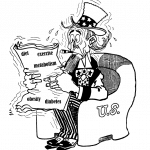As an industry, health and wellness is… different. We have HIPAA concerns and our products and services directly affect our customers’ health. And when it works, wellness businesses change hearts and minds, improve lives, and create a happier, healthier world.
But when it comes to strategy, business planning and operations, difference can be our enemy.
We’re all individuals! (“I’m not.”)
There’s this great scene in Monty Python’s movie, Life of Brian, in which a crowd of followers has gathered in the square outside the window of the room where Brian, who has consistently been mistaken for the Messiah throughout the movie, has stayed for the night. Desperate to disperse the crowd, Brian exhorts them to stop following him. Brian explains to the crowd that “you’re all individuals. You’re all different!” The crowd exclaims in unison, “We’re all individuals! We’re all different!” Then one guy in the back says, “I’m not.”
It’s a pattern we see repeated all too often in wellness. Very few businesses actually acknowledge their sameness.
It’s rare that we run across a wellness business who says they’re just a a gym, yoga studio, personal training business, inspirational wellness speaker, or supplement distributor. No, WE’RE the un-gym! The one-of-a-kind outdoors-focused personal trainer, the change-your-health-to-change-your-life speaker, the patented raw food cleanse diet, the… you name it.
Think about it. Globally, healthy eating, nutrition, and weight loss ALONE comprised a half-trillion-dollar industry as of 2013. There are 20,000 spas in the US doing $14 billion in their tiny little segment of wellness. 30,000 gyms and 58 million gym memberships. Tens to hundreds of thousands of business like yours. And even if you’re special, the chances that your business is even a one-in-a-thousand thing are slim to none.
The chances that your brand is truly unique are almost nonexistent.
And that’s a good thing.
Similarity means predictability
When you open your yoga studio, the chances are very, very good that somewhere, somebody has opened another one that’s successful. They’ve already figured out what kind of advertising works best, what to charge customers, and how big the storefront should be. They’ve already figured out how many classes per week they can fill. And if they are somehow special to their zip code, you can just keep checking other studios in other zip codes until you get the general idea of how things are run.
In fact, SO predictable that there are actually websites devoted to helping you get things set up specifically for a profitable yoga studio.
Whatever your angle, finding a similar business means less work for you to do. You don’t have to copy what they do — after all, they might not be as successful as you think! But if you have no idea where to start, it’s better than starting at zero.
In business, unique means “painfully custom”
The moment you decide your wellness business is special, understand that it means there are certain parts of completely normal business processes where “gravity doesn’t work.” Maybe it’s your customer, patient, or member intake process — perhaps it’s interview based and not form-based, a “get to know you” kind of thing. That’s OK, but it means taking more time and more of the burden of form-filling and classification onto your business. Perhaps it means that your trainers combine diet and exercise planning, and that means you only hire trainers who are ALSO nutritionists.
Whatever the case, when it comes to the day-to-day, non-brand-defining operations of your business, don’t re-invent the wheel. If you can afford to go the “standard” route, do. Use off-the-shelf accounting or member management software. Wash and dry your towels the same way everyone else does. Unless you’re planning on defining your brand by how you do the little things, do those things in a value-priced, cost-conscious, same-as-everyone-else kind of way. After all, you’ve got to control costs.
Want to do a custom intake process? Fine. But since it’s essentially custom and you have to recover the cost, actively market it as part of your brand, or get rid of it.
When it comes to the truly brand-defining aspects of your business, double up on that effort. If you’re about one-on-one been-there-done-that help for folks with eating disorders, then it DOES matter what kind of food you put in the vending machines, or if you even HAVE vending machines. If you’ve built your business around training folks to do Ironman competitions, then don’t spend as much (if any) time or money on family fun runs or weekly walk-a-thons.
Outstanding in your field means: out… standing in your own field
There’s no intrinsic problem with being THE go-to place for the narrow cadre of enthusiasts who are hell-bent on Trekking the Arctic Wastelands or Ultramarathoning The Sahara Desert. After all, businesses like Mountain Hardwear, Northern Outfitters, WAA, and Raidlight have made their name doing this.
The OPERATIONAL problem with over-specializing is that it shrinks your customer base and raises your prices because you have chosen to provide a very specific value proposition to a narrowly defined market. You’re basically alone, or darn close to it. Yes, you can define this market… if there is one. The number of people who want to PAY to do yoga atop a blasted, wind-swept mountain peak is considerably less than the number of folks who will “like” that image on Instagram. And it may not be enough people for you to survive as a business.
Many wellness businesses would do well to consider that they’re basically a gym, yoga studio, nutritionist or chiropractor’s office, and focus on making what they actually ARE attractive in their zip code. Doing a good job at being predictable, reliable, value-priced, easy to do business with, and easy to find is not a sin.
Brand uniqueness can cost you more than it does customers
Defining and occupying a market niche accomplishes several things, not all of them good:
- Strongly identifies your brand with a specific set of needs, such as hot yoga, weightlifting, swimming, or marathoning
- Suggests to folks with more generalized fitness needs (weight loss, general health) that you might not be for them
- Closely allies your brand with a segment that already has a product- or service-specific, strong buying inclination
- Increases the opportunity to market specialized products and services to a narrower audience
- Reduces the number of leads while increasing their average quality
Such leads, when they turn into customers, are often more demanding. They take more of your time, ask more questions, and want more features. That means you have to invest more in cultivating each lead and doing everything you can to be the brand of choice for their specific objective. You may need to do more research and make tweaks to your offerings to customize them to the niche.
The cost of niche products or services is often less surprising to customers than it is to businesses. 100-mile trail runners know that their shoes have to be especially shock-absorbent and that their hydration bladders need to be extremely lightweight, high capacity, and durable. They know that training is going to be a big and expensive part of their lives. They expect to pay more.
Wellness businesses, on the other hand, can find themselves scrambling after such high-quality prospects only to discover that there aren’t enough of them to chase without raising prices, and that their run-of-the-mill nutrition advice designed for couch potatoes is useless for somebody burns 4000 calories a day and definitely not worth the extra money.
Serving a niche market means getting to know that market very, very well, and hiring people who know how to sell, market to, and serve that market.
And that costs more money.
How do you capture a unique customer?
As the old joke’s punch line goes, “Unique up on him.”
Sometimes uniqueness just isn’t necessary even when marketing to a specialized niche. Sometimes a combination of unique marketing and fairly ordinary product can do wonders and help your brand appeal to a wider audience with varying degrees of specialty of need.
Whether or not your fitness or wellness business should truly emphasize its uniqueness depends on a number of factors:
- Whether that uniqueness appeals to the target audience. I read a review recently of extreme weather socks written by a fellow who had completed the Likeys 6633 Arctic Ultra, a 350-mile ultramarathon that takes place mostly in the Arctic Circle. The idea of dry feet was definitely appealing to the reviewer.
- Whether the uniqueness is valued more than non-unique alternatives. The reviewer mentioned above said that under all his gear, ordinary wicking socks served him better than the extreme weather version.
- Whether the target market is large enough and reachable given your resources. Only 16 people have completed the Likeys Arctic Ultra, and they’re spread all over the world. Most of them know each other on a first-name basis. Maybe as many as 200 register each year.
- Whether the target market is willing to pay extra for the uniqueness. Had the extreme weather socks worked better than anything else, most of the runners would have paid virtually any price for them.
- How much extra? Not more than their supply sled.
By the standards above, the arctic extreme weather socks were a nice idea that didn’t work and didn’t sell. From a sales and marketing perspective, it would have been better to focus on widening the appeal of ordinary performance athletic socks to a broader audience of special-use customers. The “halo” conferred upon the brand for its “tough gear” appeal to a broad class of users would have outweighed the cost to develop and market product to a grand total of a few hundred runners.
It’s important to examine your fitness or wellness business’s claim to brand uniqueness. First of all, is it truly unique? Second, who are the customers and are there enough of them? Third, (why) does it matter? Fourth, will they pay extra for that uniqueness? Fifth, can you actually afford to be unique? If the answer to any of these is unknown, then you’re better off focusing on financially sound business plans, standard operational process and systems, and reliable methods for lead generation and customer acquisition.




